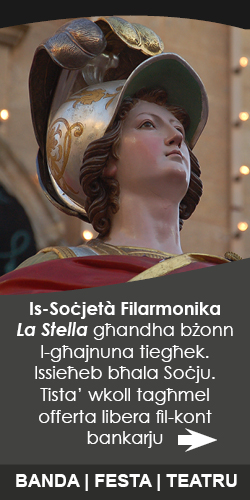GLORIOUS TURANDOT
Not that there was really any shadow of doubt as to the outcome: it was all written in the bill! Having secured the services of top quality artists, the availability of a magnificent choral force, an experienced, highly motivated and ambitious stage crew, an inspiring artistic director and the seasoned conductor, the outcome was a matter of course. This is what the Teatru Astra has achieved over the years: refinement, excellence and high quality entertainment have come to expected as a matter of course. The hundreds of patrons who packed the 2 really star-lit nights come to the Teatru Astra in eager anticipation of the sheer delight which they have come to expect. They were not disappointed. Indeed, “Gloria al vincitore!”: the victors were many at the Astra. High culture on our tiny island triumphed once more: the barrier between stage and hall, the performers and opera enthusiasts dissolved. There is hardly anything more effective in coalescing various elements into one, than a top notch musical experience.
To state that Francesca Patanè in the title role was absolutely gripping is to state the obvious. World status singers have graced the Astra boards and Patanè has added her unmistakable timbre and regal stage presence, leaving an indelible mark on one and all. The role is a killing one: mercy is deliberately left out: her vocal line bristles with resentment, mischievous taunts and murderous shafts. The consistently high tessitura could prove a mine field for the rash and the overtly ambitious. Patanè rode the storm with poise, confidence and drive. Her contro-figura in the role of the demure slave, Liu’ with the absolutely ravishing vocal line flowing direct from Puccini’s romantic vein, could hardly have been better sung by Miriam Cauchi. She did not just sing the part: she was Liù: heart, body and soul. Beautiful and effortless singing, nuanced phrasing, and attention to detail marked her milestone interpretation. The Astra is justly proud to be credited with having consistently shown faith in the musicianship of Ms Cauchi and offered her the unique possibility to feature alongside world class opera singers, time and again. Her Liù could stand the test on the boards of any world famous opera house.
Antonino Interisano had already proved his sterling worth in Pagliacci and Cavalleria Rusticana at the Astra. This time around, he outdid his previous formidable performances. Blessed with a natural spinto tenor, and possessing seemingly unbounded reserves of vocal power, Interisano’s Calaf will not easily be forgotten. Lyricism comes natural to him, and Puccini is just that: one really has to sing. He never held back: it was a heroic performance recalling the immortal Jussi Bjorling. Franco de Grandis, a much sought after basso, combines a deep voice with remarkable clarity: the result is stunning. It is indeed a pity that Puccini did not provide Timur with a befitting aria! Ping, Pong and Pang, the so-called 3 masks, interpreted by tenors Giovanni Maini, and Davide Malandra, and baritone Marco Chingari, provided the tragic-comic dimension with their restrained clowning and stylish performance. To state that baritone Marco Chingari sung the part of Pang, speaks volumes about the standard of the main cast. A superb baritone, who has become a stable presence at the Astra, Chingari possesses a voice which allows him to move with disarming ease from such roles as Iago to Ping! Kevin Caruana was a creditable Mandarino, and Mario Portelli was as secure an Altoum as anyone would have wished.
Turandot falls flat without a great choir. And that is what the Astra opera Chorus was: great. Producing a homogeneous glorious sound, the Astra opera chorus did the hard-working Choir Mistress Ms Maria Frendo and the entire team proud. Secure entries, poise and clarity of diction characterized the choir’s performance. The children’s entries provided the unmistakable ethereal touch. In Turandot Puccini got as near to Verdi as he could as regards choral writing. Grand choral pieces alternate with quasi-frenzied interjections. The choir is practically on stage from the word “go”! It is no secret that the Astra opera chorus has come to be a benchmark in the local opera scene. It is not off the mark to state that the Astra opera chorus is an exemplar non imitabile. Just ask the cognoscenti!
Artistic director Mario Corradi, ably aided by Dorothy Baldacchino, saw to it that the production reached impressive levels, coaxing the very best out of one and all. Patrons have come to expect a real opera production when at the Astra, and not an oratorio-like one. Movement, reaction and dynamism characterized the chorus’/principals’ stage presence, helping in no small way to involve the audience in the unfolding of the drama. Alison White choreographed the mesmerizing slick, sensuous movements of the dancers taunting a feverish Calaf. The superb sets designed by Corradi and entirely constructed by the resident team headed by artist Joseph Cauchi and stage manager Carmel Zammit held the audience in thrall. Lighting effects, handled by Ivan Galea, George Zammit and Ismael Portelli, added to the magical atmosphere. The costumes department, managed by George Farrugia, Manuel Grima and Sartoria Arrigo (Milan), provided a feast for the eyes, complimenting the stage setting. The highly informative and attractive opera booklet was designed and edited by Michael Formosa. The National Philharmonic Orchestra conducted by resident musical director Prof. Joseph Vella rose to the occasion. Mro Vella’s consummate all-round musicianship has once again ensured that the heights reached at the Astra remain unequalled.
No wonder that the audience just did not want to let go of the prolonged applause at the end of the opera. Well-timed intervals ensured that the production moved along splendidly and everyone was just disappointed that such a glorious evening had to come to so rapid an end!
Indeed, “Gloria al vincitore!”: at the Astra high culture was the victor this week.
photos by Joe Attard (new photos uploaded)



